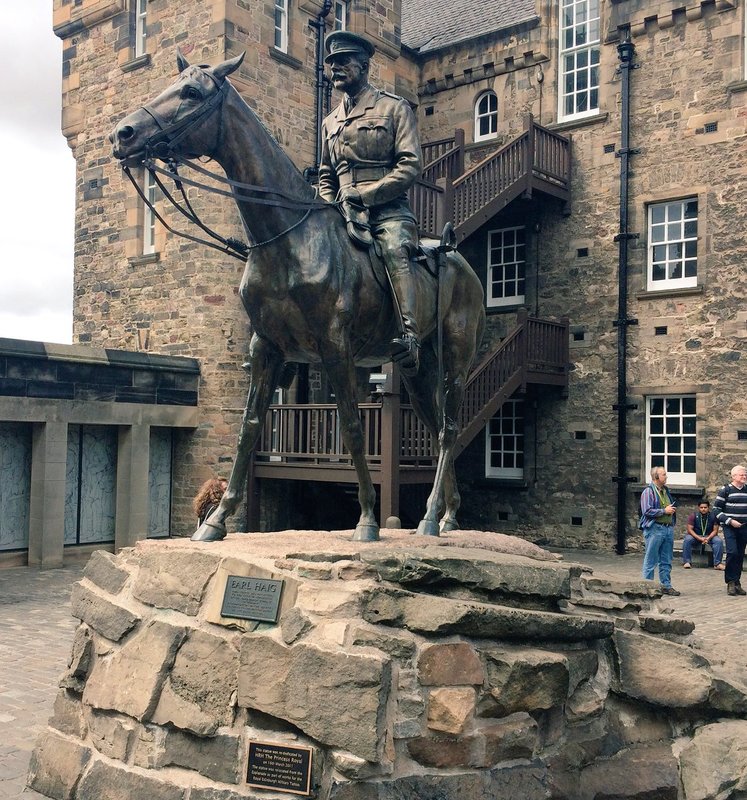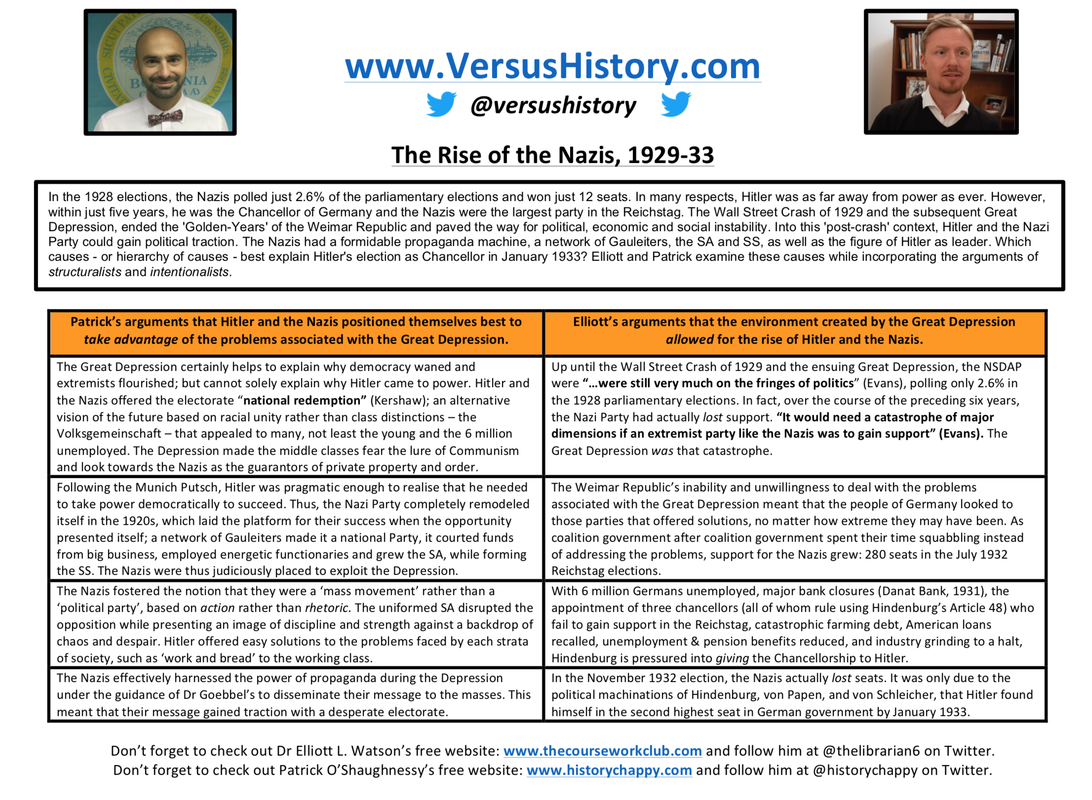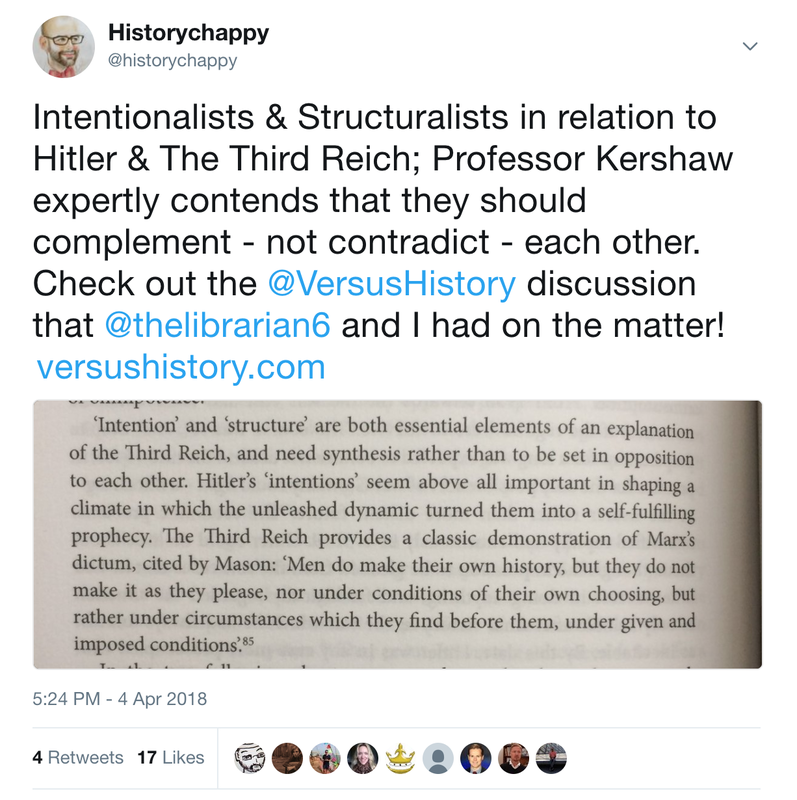|
Versus History Podcast #5 on Field Marshal Haig was - in my opinion - one of our very best. The fact that Douglas Haig’s reputation and performance in WW1 has received so much scrutiny from academic historians (and war poets) over the years highlights that this is a genuine historical controversy. In addition, select politicians and academic historians have cast a critical eye on the pedagogical methods used by some teachers when delivering the topic in classrooms. Therefore, Elliott and I felt that the stakes were high with this one. Professor Gary Sheffield - author of many acclaimed works on Haig - wishing us well before the debate served only to amplify the sense of occasion. The Podcast is there for all; feel free to let us know your thoughts, feedback and critique.
In any event, one key argument used to attack Haig’s performance and / or abilities during WW1 is his quote about the ongoing value of horses in warfare: I believe that the value of the horse and the opportunity of the horse in the future is likely to be as great as ever. Aeroplanes and tanks are only accessories to the men and the horse, and I feel sure that as time goes on you will find just as much use for the horse—the well bred horse—as you have ever done in the past. Haig was indeed a cavalry officer before WW1. Whilst researching for the Podcast, I encountered much academic literature and scholarly opinion which utilised this quote - and Haig’s long term trajectory towards Commander-in-Chief of the British Expeditionary Force - as the basis for a wider argument that Haig’s views on warfare were anachronistically rooted in his past experiences of the Boer War. However, the dawn of mechanised tank in 1916 did not result in the immediate transformation of the nature of warfare in the twentieth century. Far from it. The German Wehrmacht - known for the ferocity and incisiveness of their Panzer divisions during WW2 some 20 years later - relied heavily upon the horse between 1939 and 1945. Professor Timothy Snyder of Yale University made this very point in his book ‘Black Earth’; “...even the army of the famed Blitzkrieg moved chiefly by horsepower’ (p.306) The fact that one of the most devastating military operations of modern history - the Nazi Blitzkreig that laid waste to Europe - used the horse as the logistical spine of their transport operations, must - to some extent - serve to vindicate Haig in this regard. If I could wind back the clock to the debate itself, I would have made just this point. The fact that the tank made its debut ‘on his watch’ at the Battle of the Somme in 1916 should demonstrate that Haig was no luddite or technophobe. Given that the horse played a pivotal part in the Nazi war machines’ transport and logistics operations, this should serve to vindicate Haig’s comments about the future role of the animal in warfare. I am sure that Versus History will touch on a theme related to World War One again soon. Thanks for reading Patrick O’Shaughnessy Co-Editor Versus History (@historychappy)
2 Comments
Podcast #16 was a real game changer for the Versus History project. Both Elliott and I really enjoyed researching it, as we always do. We dug deep into the historiographical vaults, drew on our pre-existing knowledge and sought the counsel of those with sagely wisdom on the topic. There was little left in the work of Kershaw, Evans, Hinton, Bullock and Roberts that we didn't consider. However, there is nothing particularly revolutionary about any of that. Nor was it the first time that we had sat down in our favourite Arabic cafe in Bahrain to discuss matters historical. After all, we never say no to a spot of Moroccan mint tea when researching and debating! The turning point for the project came not so much in the method of research than it did in the substantive conclusions at which we arrived. Versus History debate until this point had relied almost exclusively on assuming contrasting standpoints on key issues of historical interest. This had proved to be largely successful for the debates that we had hitherto conducted; Field Marshal Haig, the Cold War, Malcolm X, etc. Indeed, it proved a solid conceptual platform from which to launch our parallel enquiries and deliver a debate. The key substantive results are outlined below, which can be downloaded free, of course. I attempted to argue from what was essentially a typically Intentionalist perspective, that it was ultimately the actions of Hitler and the Nazis that provided the crucial reason for them rising to power by 1933. Contrastingly, Elliott argued from the perspective of a Structuralist, contending that it was ultimately the context created by the Great Depression that provided the pivotal reason for Hitler's ascent to the Chancellorship by January 1933. These are both arguments that we have seen many times at GCSE and Post-16 level. What was really enlightening about this debate was that our findings complemented - rather than explicitly contradicted - each other. The consensus was that whilst Hitler would never have risen to the Chancellorship without the context of the Great Depression, he would never have been able to seize the unique opportunity presented by the Depression if had not actively prepared the Party for the opportunity in the 1920s and then seized it with campaigning, projecting an image of a 'mass movement', propaganda, etc. Perhaps more interesting still, the conclusion that 'Intentionalist' and 'Structuralist' perspectives are two sides of the same coin had deep roots in the historical scholarship of Ian Kershaw, as outlined below; Podcast #16 continues to be one of the most popular Versus History debates available through the iTunes medium. The findings demonstrate that occasionally, we need to move beyond cognitive binaries if we are to have an historical debate that offers a rigorous and meaningful discussion based on rich historiography.
Here's to more of the same! You can download Versus History Podcast #16 here. Thanks for reading. Patrick (@historychappy) |
Categories
All
Archives
March 2024
|



 RSS Feed
RSS Feed